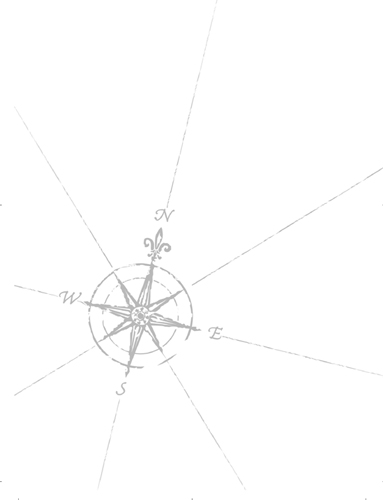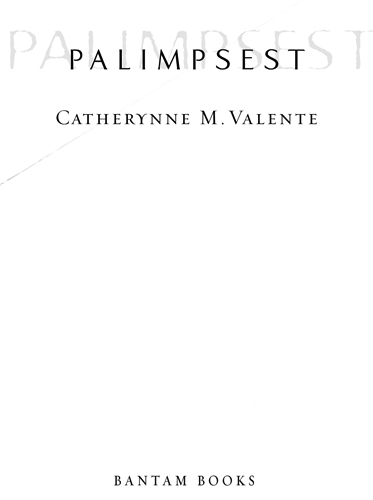Palimpsest
Authors: Catherynne Valente




Contents
FRONTISPIECE: The Cradle of Becoming and Unbecoming
THREE: The Dreamlife of Lock and Key
PART I: Incipit Liber de Naturis Bestiarum
212th, Vituperation, Seraphim, and Alphabet
PART III: The Princess of Parallelograms
TWO: The Business of Human Purity
TWO: Things Which Are Full of Grace
For Dmitri,
the map by which
I found this place
Look, how the floor of heaven Is thick inlaid with patines of bright gold: There’s not the smallest orb which thou behold’st But in his motion like an angel sings, Still quiring to the young-eyed cherubins; Such harmony is in immortal souls; But, whilst this muddy vesture of decay Doth grossly close it in, we cannot hear it.
—
WILLIAM SHAKESPEARE
The Merchant of Venice
FRONTISPIECE:
T
HE
C
RADLE OF
B
ECOMING AND
U
NBECOMING
16th and Hieratica
O
N THE CORNER OF
16TH
S
TREET AND
H
IERATICA
a factory sings and sighs. Look: its thin spires flash green, and spit long loops of white flame into the night. Casimira owns this place, as did her father and her grandmother and probably her most distant progenitor. It is pleasant to imagine them, curling and uncurling their proboscis-fingers against machines of stick and bone. There has always been a Casimira, except when, occasionally, there is a Casimir.
Workers carry their lunches in clamshells. They wear extraordinary uniforms: white and green scales laid one over the other, clinging obscenely to the skin, glittering in the spirelight. They wear nothing else; every wrinkle and curve is visible. They dance into the factory, their serpentine bodies writhing a shift change, undulating under the punch clock with its cheerful metronomic chime. Their eyes are piscine, third eyelid half-drawn in drowsy pleasure as they side step and gambol and spin to the rhythm of the machines.
And what do they make in this factory? Why, the vermin of Palimpsest. There is a machine for stamping cockroaches with glistening green carapaces, their maker’s mark hidden cleverly under the left wing. There is a machine for shaping and pounding rats, soft gray fur stiff and shining when they are first released. There is another mold for squirrels, one for chipmunks and one for plain mice. There is a centrifuge for spiders, a lizard-pour, a delicate and ancient machine which turns out flies and mosquitoes by turn, so exquisite, so perfect that they seem to be made of nothing but copper wire, spun sugar, and light. There is a printing press for graffiti which spits out effervescent letters in scarlet, black, angry yellows, and the trademark green of Casimira. They fly from the high windows and flatten themselves against walls, trestles, train cars.
When the shift horn sounds at the factory, the long antler-trumpet passed down to Casimira by the one uncle in her line who defied tradition and became a humble hunter, setting the whole clan to a vociferous but well-fed consternation, a wave of life wafts from the service exit: moles and beetles and starlings and bats, ants and worms and moths and mantises. Each gleaming with its last coat of sealant, each quivering with near-invisible devices which whisper into their atavistic minds that their mistress loves them, that she thinks of them always, and longs to hold them to her breast.
In her office, Casimira closes her eyes and listens to the teeming masses as they whisper back to their mother. At the end of each day they tell her all they have learned of living.
It is necessary work. No family has been so often formally thanked by the city as hers.
_______
On the other side of the street: a fortune-teller’s shop. Palm fronds cross before the door. Inside are four red chairs with four lustral basins before them, filled with ink, swirling and black. Orlande lumbers in, a woman wrapped in ragged fox fur. Her head amid heaps of scarves is that of a frog, mottled green and bulbous-eyed. A licking pink tongue keeps its place in her wide mouth. Her webbed hands are full of cups: a swill of tea afloat with yellow leaves. She spills not a drop, and the tea is sweet, sweeter than anything.
She does not see individual clients.
Thus it is that four strangers sit in the red chairs, strip off their socks, plunge their feet into the ink-baths, and hold hands under an amphibian stare. This is the first act of anyone entering Palimpsest: Orlande will take your coats, sit you down, and make you family. She will fold you four together like Quartos. She will draw you each a card—look, for you it is the Broken Ship reversed, which signifies Perversion, a Long Journey without Enlightenment, Gout—and tie your hands together with red yarn. Wherever you go in Palimpsest, you are bound to these strangers who happened onto Orlande’s salon just when you did, and you will go nowhere, eat no capon or dormouse, drink no oversweet port that they do not also taste, and they will visit no whore that you do not also feel beneath you, and until that ink washes from your feet—which, given that Orlande is a creature of the marsh and no stranger to mud, will be some time—you cannot breathe but that they breathe also.
_______
There are four of them there now. Shall we peer in? Shall we disrupt their private sacraments? Are you and I such unrepentant voyeurs? I think we must be, else why have we come so close to the door of cassia, the windows of cracked glass? Let us peer; let us disrupt. It is our nature.
A girl with blue hair slumps slack against her chair. Her listless hand is tied to the wrist of a man with thinning blond hair. His unkept fingernails are thoroughly stained with violet-black ink, his attention sharp, his gaze fixed on Orlande, who is for him a miracle, a revelation—for her he is another customer and she will forget him easy and quick. Another woman, too, is there. A wimple of vague dark hair hangs over her shoulders; a bee sting blooms on her cheek like a kiss. Her fingers are entwined with a young, skinny thing, a bundle of keys at his belt, his trousers gray, workmanlike. He tries to catch the woman’s gaze—but he will fail. She is not for you, poor boy!
They are so young, young and sleepy and unknowing—unknowable, if you want to know the truth. Orlande’s muddy ink seeps up through the soles of their feet and the girl with blue hair yawns, a frank and unchecked gesture, like a newborn swaddled in her crèche.
ONE
S
IC
T
RANSIT
T
OKYO
S
ei pressed her cheek against the cold glass; strips of black mountains tore by under lantern-blue clouds beyond her wide window. She knew a man was watching her—the way men on trains always watched her. The train car rocked gently from side to side, hushing its charges like a worried mother. She chewed on the ends of her dark blue hair. A stupid childhood habit, but Sei couldn’t let it go. She let the wet curl fall back against her bare shoulder blades. She stroked the glass with her fingertips, shifted her hips against the white of the carriage—she was always moved to do this on the long-distance trains which crisscrossed the islands like corset stays. They were so pale and pure and unfathomably fast, like iridescent snakes hissing down to the sea. The Shinkansen was always pristine, always perfect, its aim always true.
Sei’s skin prickled as the man’s eyes slid over her back. She felt their cold black weight, shifting her shoulders to bear up under it. He would be watching the small of her back now, where her silver-black shirt fell away into a mess of carefully arranged silk ropes and tin chains. He would watch her angles under the strings, the crease of her legs beneath an immodest skirt, her lips moving against the glass. The little wet fog of her breath. She could almost tell what he looked like without turning her head: good black suit, a little too small, clutching his briefcase like a talisman, probably a little gray at the temples, no rings on his hands. They all looked like that.
Sei turned, her blue hair brushing her hipbones. Good black suit, a little too small, clutched briefcase, freckles of gray in the hair. No rings. He did not seem startled or doubled over with desire as they sometimes were. He was calm, his answering smile measured and almost sweet, like a photograph of a soldier lost in a long-ago war. Coolly, without taking his dark eyes from hers, he turned over his left palm and rested it on the creamy brown edge of his briefcase.
His hand was covered in a mark she first thought horrible—it snaked and snarled, black and swollen, where fortune-teller’s lines ought to have been. Like a spider it sent long web-spokes out from a circle in the center, shooting towards the pads of his fingers and burrowing into the tiny webbing of skin between them. She took a step forward, balancing expertly as the car sped on, and stared. It was something like a little map, drawn there by an inartful and savage hand. She could make out minuscule lettering along the inky corridors: street names she could hardly read. There seemed even to be an arcane compass near his thumb. As she leaned in, the man shut his fist.
